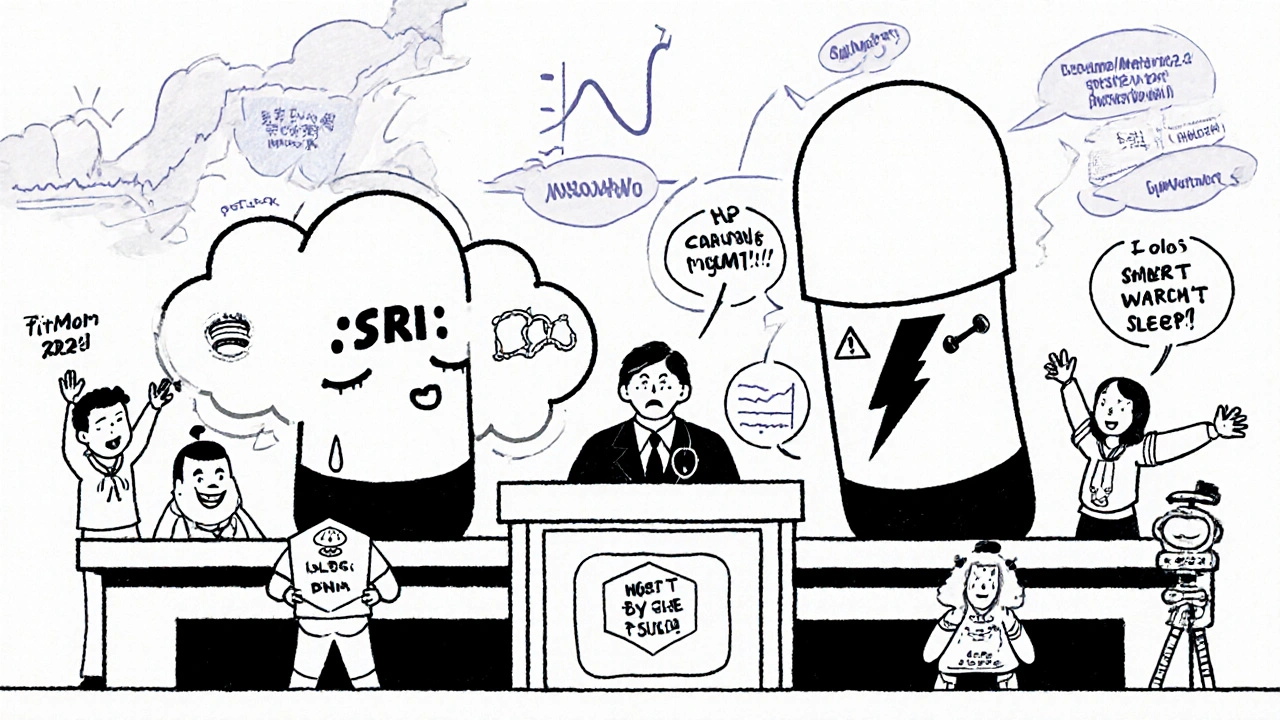Bupropion vs SSRIs: Side Effects Compared for Real-World Use
 Nov, 21 2025
Nov, 21 2025
Depression Treatment Decision Guide
Assess your situation
This tool helps you understand which antidepressant might better match your symptoms and medical history based on real-world evidence from the article.
Your Recommendation
Important Considerations
Why Side Effects Matter More Than You Think
Choosing an antidepressant isn’t just about whether it works-it’s about whether you can live with how it makes you feel. Two of the most common options, bupropion and SSRIs, both help with depression, but their side effects are worlds apart. If you’ve ever felt numb, sluggish, or lost interest in sex after starting an SSRI, you’re not alone. And if you’ve been told bupropion might help but are worried about anxiety or seizures, you’re asking the right questions. The truth is, your experience with these drugs will depend more on your body’s reaction than on clinical trial averages. Let’s break down exactly how they differ, what to expect, and who each one suits best.
How Bupropion and SSRIs Work (And Why It Changes Everything)
Bupropion, sold under brand names like Wellbutrin and Zyban, doesn’t touch serotonin at all. Instead, it boosts norepinephrine and dopamine-two brain chemicals tied to energy, motivation, and focus. That’s why many people feel more alert on bupropion, not sleepy. SSRIs, like sertraline (Zoloft), escitalopram (Lexapro), and fluoxetine (Prozac), do the opposite: they increase serotonin levels. Serotonin helps with mood, but it also controls digestion, sleep, and sexual function. That’s why SSRIs often cause nausea, drowsiness, and sexual problems. The difference in how they work isn’t just academic-it directly shapes what you’ll feel day to day.
Sexual Side Effects: The Biggest Dealbreaker
For many people, sexual side effects are the #1 reason they quit SSRIs. Studies show 30% to 70% of SSRI users report problems like low libido, trouble getting aroused, or delayed or absent orgasm. Paroxetine (Paxil) is the worst offender, with up to 76% of users affected. Bupropion? Only 13% to 15% report sexual issues-roughly one-third the rate of SSRIs. A 2015 study in the Journal of Sexual Medicine found that 67% of people who switched from an SSRI to bupropion saw their sex drive come back. Even when doctors add bupropion to an SSRI to counteract sexual side effects, 70-80% of patients improve. On Drugs.com, 47% of negative reviews for Lexapro mention lost sex drive. In contrast, only 8% of bupropion reviews cite the same issue. If your sex life matters to you, this isn’t a small detail-it’s a dealbreaker.
Weight Gain vs. Weight Loss
SSRIs often lead to weight gain. Over 6 to 12 months, people on paroxetine or sertraline typically gain 2.5 to 3.5 kilograms. That’s not just a few pounds-it’s clothes that no longer fit, scales that keep climbing, and feelings of frustration. Bupropion does the opposite. In clinical trials, users lost an average of 0.8 to 1.2 kg over the same period. One 2009 study found that people taking bupropion XL 400 mg daily lost 7.2% of their body weight in 24 weeks. On Reddit, users like ‘FitMom2022’ say, “No weight gain after 18 months.” Meanwhile, ‘ScaleWatcher’ on Drugs.com wrote, “Gained 25 pounds in one year” on Zoloft. If you’re managing your weight or have a history of disordered eating, this difference is huge. But if you’re underweight or have an eating disorder, bupropion is off-limits.
Sleepiness vs. Energy
SSRIs like paroxetine and fluoxetine often cause drowsiness, especially in the first few weeks. Many people say they feel like they’re moving through fog. Bupropion is the opposite-it’s energizing. That’s why it’s sometimes prescribed for fatigue in people with chronic illness or even ADHD. A 2002 meta-analysis showed bupropion was 73% less likely to cause somnolence than SSRIs. On Drugs.com, users say, “Finally feel awake during the day unlike when I took Zoloft.” But that energy can backfire. If you struggle with anxiety or insomnia, bupropion might make it worse. One user on Reddit wrote, “Switched from Lexapro to Wellbutrin-my libido came back, but I haven’t slept through the night in weeks.” If you need calm, SSRIs might be better. If you need to feel alive, bupropion wins.

Anxiety: The Hidden Risk with Bupropion
Bupropion isn’t the best choice if anxiety is part of your depression. Its stimulating effect can make panic, restlessness, or jitteriness worse. A 2017 study found that 28% of people with anxiety disorders stopped bupropion because of increased anxiety-nearly double the rate of those on SSRIs. SSRIs, while they can cause initial nervousness, tend to calm anxiety over time. That’s why doctors often pick sertraline or escitalopram for people with both depression and generalized anxiety disorder. If you’re prone to panic attacks or constant worry, bupropion might feel like pouring gasoline on a fire. Don’t assume it’s “better” just because it doesn’t cause weight gain or sexual problems-it can make other symptoms worse.
Seizure Risk: What You Need to Know
Bupropion carries a real, though small, risk of seizures. At 300 mg per day, the risk is about 0.1%. At 400 mg, it jumps to 0.4%. That’s still rare, but it’s 10 times higher than SSRIs, which have a seizure risk of just 0.02% to 0.04%. That’s why bupropion is never prescribed to people with epilepsy, a history of seizures, or eating disorders like bulimia. It’s also risky if you’re drinking heavily or taking other drugs that lower your seizure threshold. SSRIs don’t have this concern. If you’ve ever had a seizure, even years ago, or if you’ve ever passed out from alcohol withdrawal, tell your doctor. This isn’t something to ignore.
Blood Pressure and Heart Health
Bupropion can raise your blood pressure slightly-by 3 to 5 mmHg on average. That’s not huge, but it matters if you already have high blood pressure or heart disease. Your doctor should check your BP every 2 to 4 weeks when you start it. SSRIs usually have no effect or even slightly lower blood pressure. If you’re on medication for hypertension, bupropion might interfere. It’s not dangerous for most people, but it’s a factor you can’t overlook, especially if you’re older or have a family history of heart problems.
What Happens When You Switch?
If you’re switching from an SSRI to bupropion, timing matters. Fluoxetine (Prozac) sticks around in your system for up to 6 days. If you start bupropion too soon, you risk serotonin syndrome-a rare but serious condition with symptoms like confusion, rapid heart rate, and muscle stiffness. Wait at least 2 weeks after stopping fluoxetine. For other SSRIs like sertraline or escitalopram, 1 week is usually enough. Never stop an SSRI cold turkey-it can cause dizziness, brain zaps, or flu-like symptoms. Taper slowly under medical supervision. The same goes for switching back. Going from bupropion to an SSRI is usually smoother, but still needs planning.

Real People, Real Experiences
On Drugs.com, bupropion has a 7.4/10 rating from over 1,800 reviews. About 68% say it helped. Common praises: “No weight gain,” “I feel like myself again,” “Sex drive returned.” The negative reviews? “I couldn’t sleep,” “My anxiety exploded,” “I had ringing in my ears that never went away.” SSRIs like Lexapro have a 6.8/10 rating. The top complaints? “Lost all interest in sex,” “Gained 25 pounds,” “I felt like a zombie.” A 2021 survey found that 63% of people preferred bupropion for fewer sexual side effects, but 71% of those with anxiety preferred SSRIs. Real life isn’t a clinical trial-it’s a personal trade-off.
Who Should Take Which?
Choose bupropion if:
- You’re struggling with sexual side effects from another antidepressant
- You’ve gained weight on SSRIs and want to lose it
- You feel sluggish or sleepy and need more energy
- You don’t have anxiety, seizures, or an eating disorder
- You’re not on other medications that lower your seizure threshold
Choose an SSRI if:
- You have anxiety, panic attacks, or OCD
- You’ve had seizures in the past
- You’re underweight or have an eating disorder
- You’re sensitive to stimulants or have uncontrolled high blood pressure
- You need a gentler start and don’t mind possible drowsiness
What’s New in 2025?
Doctors are starting to use genetic testing to guide antidepressant choices. The 2023 GUIDED trial showed that using DNA tests to pick the right drug improved remission rates by 14.2%. If you’ve tried multiple antidepressants without success, ask about pharmacogenetic testing. It’s not perfect, but it can help avoid trial-and-error. Also, a new extended-release form of bupropion (Aplenzin) lets you take one pill a day instead of two. That’s easier for busy people. The bottom line: treatment is getting smarter. It’s not just about what works-it’s about what works for you.
Final Thought: It’s Not About the Best Drug-It’s About the Right One
There’s no single best antidepressant. The one that works for your friend might wreck your life. Bupropion isn’t “better” than SSRIs-it’s different. It’s the choice for people who need to feel awake, motivated, and sexually alive. SSRIs are the choice for people who need calm, who struggle with anxiety, or who can’t risk seizures. Your job isn’t to pick the most popular drug. It’s to pick the one that fits your body, your symptoms, and your life. Talk to your doctor. Track your symptoms. Don’t be afraid to switch. You deserve an antidepressant that helps-not one that just masks your pain with new problems.
Can bupropion help with SSRI-induced sexual dysfunction?
Yes. Studies show that switching from an SSRI to bupropion improves sexual function in about 67% of cases. Adding bupropion to an ongoing SSRI regimen also helps-around 70-80% of people see improvement in libido, arousal, or orgasm. This is why bupropion is often used as an add-on treatment when sexual side effects become unbearable.
Does bupropion cause weight gain?
No-most people lose a small amount of weight on bupropion. On average, users lose 0.8 to 1.2 kg over 6 to 12 months. Higher doses (like 400 mg daily) can lead to more significant weight loss-up to 7.2% of body weight in 24 weeks. This is the opposite of most SSRIs, which often cause weight gain.
Is bupropion safe if I have anxiety?
Not usually. Bupropion is stimulating and can worsen anxiety, restlessness, or panic attacks. In one study, 28% of people with anxiety disorders stopped taking bupropion because their symptoms got worse. SSRIs like sertraline or escitalopram are generally better choices for people with both depression and anxiety.
How long does it take for bupropion to start working?
Most people notice improvements in energy and motivation within 1 to 2 weeks. Mood improvements usually follow after 4 to 6 weeks. This is faster than SSRIs, which often take 6 to 8 weeks to show full effects. But don’t stop early-give it time, and track your symptoms weekly.
Can I take bupropion with an SSRI?
Yes, but only under close medical supervision. Combining them can help with sexual side effects or treatment resistance, but it increases the risk of serotonin syndrome and seizures. One case report documented a seizure in a patient taking bupropion 300 mg/day with escitalopram 20 mg/day. Your doctor will monitor you closely and likely start with low doses.
What are the most common side effects of bupropion?
The most common side effects are dry mouth, insomnia, headache, and nausea. About 1 in 5 people report increased anxiety or restlessness. Seizures are rare but serious-risk increases with higher doses. Blood pressure may rise slightly, so regular checks are recommended. Avoid alcohol and other drugs that lower seizure threshold.
Why is bupropion not first-line for depression?
It’s not because it’s less effective-it’s because of its risks. SSRIs have a broader safety profile and are better for anxiety, which often coexists with depression. Bupropion is typically used when sexual side effects, weight gain, or fatigue are major concerns. The American Psychiatric Association lists it as a first-line option specifically for patients with sexual dysfunction from SSRIs.
Next Steps: What to Do Now
If you’re currently on an SSRI and unhappy with side effects, don’t quit cold turkey. Talk to your doctor about switching. Keep a symptom journal for 2 weeks-note energy levels, sleep, sex drive, appetite, and mood. If you’re considering bupropion, ask about your seizure risk and blood pressure history. If you have anxiety, be honest about it. Your doctor isn’t judging-they’re trying to find the right fit. There’s no shame in trying different options. Antidepressants aren’t one-size-fits-all. Finding the right one might take time, but it’s worth it.

Richard Wöhrl
November 21, 2025 AT 23:15Let me just say this: if you're on an SSRI and your sex life has turned into a ghost town, bupropion isn't just an option-it's a lifeline. I switched after 18 months of Zoloft and literally felt human again. No more numbness, no more avoiding intimacy. The insomnia? Yeah, I got that. But I'd rather be awake and horny than asleep and hollow.
Suzan Wanjiru
November 23, 2025 AT 01:26Been on Wellbutrin for 3 years. Lost 15 lbs without trying. Sleep? Barely. But I can finally finish a book without napping halfway through. SSRIs made me feel like a zombie in a slow-motion movie. This isn't about being 'better'-it's about being alive.
John Mackaill
November 24, 2025 AT 14:21My therapist pushed me toward Lexapro because I had anxiety. It worked on the worry-but killed my drive. Switched to bupropion and my anxiety spiked for two weeks. Then it settled. Now I run marathons. The key? Don't panic when it gets rough at first. Your brain's rewiring.
Henrik Stacke
November 25, 2025 AT 14:52As someone who's tried both, I can confirm: SSRIs are the quiet, gentle cousin who brings you soup when you're sick. Bupropion is the friend who kicks your door open at 7 a.m. with coffee and a challenge: 'Let's go.' Neither is right. But one might be exactly what your soul needs right now.
Adrian Rios
November 27, 2025 AT 13:32Look, I get it-people treat antidepressants like they're cereal flavors. 'Oh, I tried Prozac, didn't like it.' But this isn't about preference. It's about neurochemistry. SSRIs flood serotonin pathways and accidentally shut down libido, digestion, and motivation. Bupropion? It lights up dopamine and norepinephrine like a Christmas tree. That's why you feel energized. That's also why you can't sleep. There's no magic pill-just trade-offs. And if you're not willing to sit with the trade-offs, you're not ready for real treatment.
Bryson Carroll
November 28, 2025 AT 09:30Everyone's acting like bupropion is some miracle drug but have you read the seizure stats? 0.4% at 400mg? That's not rare-that's a gamble. And you think your 'energy boost' is worth risking a grand mal? Meanwhile SSRIs are vilified for weight gain but they don't make you hallucinate from caffeine. You're not brave-you're reckless.
Jennifer Shannon
November 28, 2025 AT 17:36I switched from Lexapro to bupropion because I couldn't stand how I felt-like I was watching my life through a foggy window. The first week was hell. Jittery. Insomnia. Thought I was losing my mind. But then... I started noticing things. The way sunlight hits the kitchen table. The smell of rain. The fact that I wanted to hug my sister again. It wasn't instant. But it was real. And honestly? That's more than I got from any SSRI.
Laurie Sala
November 30, 2025 AT 15:15Why does everyone ignore the fact that bupropion makes your mouth feel like the Sahara? I've been on it for a year and I'm constantly sipping water. My dentist is concerned. My lips are cracked. I'm not saying it's not worth it-but don't just skip the side effects. They're part of the package.
Lisa Detanna
December 1, 2025 AT 06:25My doctor told me bupropion was 'off-label' for ADHD. I didn't care. I had depression and zero focus. After two weeks, I finished a project I'd been avoiding for 6 months. No stimulant. No Adderall. Just dopamine. It's not perfect-but it's mine.
Demi-Louise Brown
December 3, 2025 AT 02:35Track your symptoms. Weekly. Use a simple scale: energy 1-10, sleep 1-10, libido 1-10. Don't rely on memory. Data beats anecdotes. And if your doctor won't let you track it? Find a new one.
Matthew Mahar
December 4, 2025 AT 08:30switched from zoloft to wellbutrin and now i cant sleep but at least i dont feel like a robot. also lost 10lbs. worth it. kinda. maybe. idk
Ross Ruprecht
December 4, 2025 AT 21:01Just read the whole thing. TL;DR: SSRIs = zombie mode. Bupropion = caffeine overdose with a side of sex drive. Pick your poison.
Casper van Hoof
December 5, 2025 AT 04:48One must consider the phenomenological weight of pharmaceutical intervention-not merely as biochemical modulation, but as an existential recalibration of the self. The SSRI user experiences a flattening of affect, a reduction of the lived world into a monochrome palette; whereas bupropion, in its dopaminergic assertiveness, reanimates the will, albeit at the cost of somatic equilibrium. One is tranquility without vitality; the other, vitality without peace. Neither is salvation. Both are compromises of the modern condition.
Kezia Katherine Lewis
December 5, 2025 AT 20:28Pharmacogenetic testing is no longer a luxury-it's a clinical imperative. The GUIDED trial data is robust. If you've cycled through three antidepressants without success, your genetics are screaming for attention. Insist on the test. It's not 'alternative medicine.' It's precision psychiatry. And yes, your insurance should cover it. Fight for it.